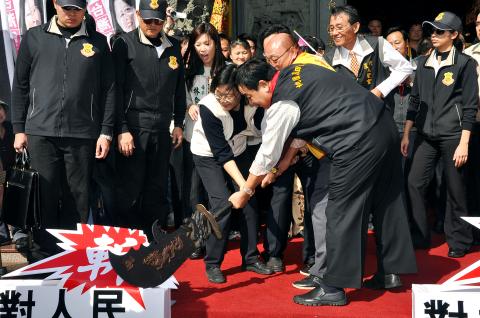Democratic Progressive Party (DPP) presidential candidate Tsai Ing-wen (蔡英文) said she was “open-minded” about a potential visit to China and that her “Taiwan consensus” initiative emphasized process over results.
In an interview with BBC Chinese published online on Thursday night, the DPP chairperson expressed her positions on a wide range of issues, including cross-strait relations, Taiwan’s external relations and the possibility of granting an amnesty to former president Chen Shui-bian (陳水扁) if she is elected in January.
Asked whether she would visit China if invited, Tsai said: “If they are in a position to issue an invitation, I’m sure there will be conditions attached ... depending on what kind of conditions they impose, I just hope [the conditions] will be reasonable.”

Photo: CNA
Tsai said she was “pretty open-minded” about engagement with China because better communication would help China better understand Taiwan, as well as the DPP.
Engagement would not necessarily require a direct visit by her, she said, adding that it could take the form of an exchange of groups of experts, civil society members or party members.
The “Taiwan consensus” she advocates represents a democratic process, during which all opinions would be included, to close the gap between people on different ends of the spectrum, she said.
While maintaining the “status quo” appears to be the consensus of the majority of the public, Taiwanese are still split about the definition of the “status quo,” she said.
“My definition of the ‘status quo’ would be ‘Taiwan is the ROC [Republic of China], the ROC is Taiwan, and Taiwan is a sovereign and independent country,’” she said.
If the DPP returned to power, it would not terminate the Economic Cooperation Framework Agreement (ECFA) signed in June last year, Tsai said, but it would re-examine the pact and make sure future negotiations are transparent, monitored by the legislature and receive support from the majority of Taiwanese.
On Taiwan’s external relations, Tsai said good relations with the US were critical because they “serve as a good balance in our dealings with China” and US arms sales would provide Taiwan with sufficient capacity to defend itself and feel comfortable in its ability to face China.
If she had to choose between the US and China, she preferred working with a democracy, which China is not yet, Tsai said.
Taiwan should also work with other countries in the Asia-Pacific region because “we are all facing a rising China.”
However, Taiwan would like to maintain decent — peaceful and stable — relations with China under “some sort of framework,” she said.
Tsai declined to directly answer whether she would grant an amnesty to Chen, who is serving a 17-and-a-half-year sentence for corruption.
The independence and fairness of Taiwan’s judicial system should be addressed before any discussion of an amnesty, she said, adding that divided opinions in Taiwan were the by-products of questionable judicial fairness.
Chen’s scandal did hurt the DPP, she said, but the party has undergone a dramatic transformation over the past three years.
“Right now, the DPP is outpacing the Chinese Nationalist Party [KMT] in terms of agenda-setting and policymaking. People’s views of the DPP have changed,” she said.

SECURITY: As China is ‘reshaping’ Hong Kong’s population, Taiwan must raise the eligibility threshold for applications from Hong Kongers, Chiu Chui-cheng said When Hong Kong and Macau citizens apply for residency in Taiwan, it would be under a new category that includes a “national security observation period,” Mainland Affairs Council (MAC) Minister Chiu Chui-cheng (邱垂正) said yesterday. President William Lai (賴清德) on March 13 announced 17 strategies to counter China’s aggression toward Taiwan, including incorporating national security considerations into the review process for residency applications from Hong Kong and Macau citizens. The situation in Hong Kong is constantly changing, Chiu said to media yesterday on the sidelines of the Taipei Technology Run hosted by the Taipei Neihu Technology Park Development Association. With

CARROT AND STICK: While unrelenting in its military threats, China attracted nearly 40,000 Taiwanese to over 400 business events last year Nearly 40,000 Taiwanese last year joined industry events in China, such as conferences and trade fairs, supported by the Chinese government, a study showed yesterday, as Beijing ramps up a charm offensive toward Taipei alongside military pressure. China has long taken a carrot-and-stick approach to Taiwan, threatening it with the prospect of military action while reaching out to those it believes are amenable to Beijing’s point of view. Taiwanese security officials are wary of what they see as Beijing’s influence campaigns to sway public opinion after Taipei and Beijing gradually resumed travel links halted by the COVID-19 pandemic, but the scale of

A US Marine Corps regiment equipped with Naval Strike Missiles (NSM) is set to participate in the upcoming Balikatan 25 exercise in the Luzon Strait, marking the system’s first-ever deployment in the Philippines. US and Philippine officials have separately confirmed that the Navy Marine Expeditionary Ship Interdiction System (NMESIS) — the mobile launch platform for the Naval Strike Missile — would take part in the joint exercise. The missiles are being deployed to “a strategic first island chain chokepoint” in the waters between Taiwan proper and the Philippines, US-based Naval News reported. “The Luzon Strait and Bashi Channel represent a critical access

Pope Francis is be laid to rest on Saturday after lying in state for three days in St Peter’s Basilica, where the faithful are expected to flock to pay their respects to history’s first Latin American pontiff. The cardinals met yesterday in the Vatican’s synod hall to chart the next steps before a conclave begins to choose Francis’ successor, as condolences poured in from around the world. According to current norms, the conclave must begin between May 5 and 10. The cardinals set the funeral for Saturday at 10am in St Peter’s Square, to be celebrated by the dean of the College